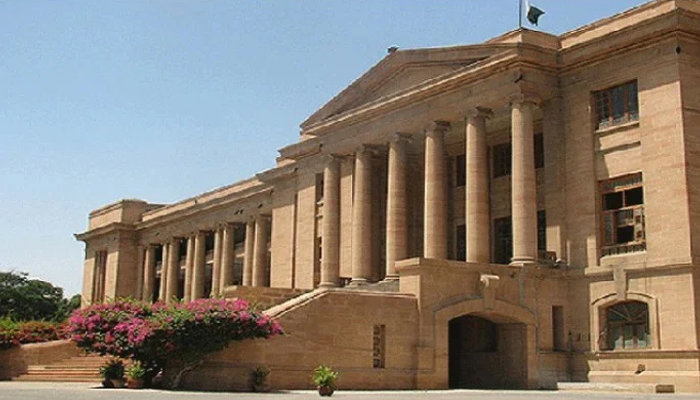SHC issues warrants for three respondents in Murtaza Bhutto murder case for not showing up
The high court was hearing appeals against the acquittal of all accused, including police officials, in the murder case
The Sindh High Court (SHC) on Monday issued bailable warrants for three respondents in Mir Murtaza Bhutto murder case for their failure to appear at the hearing and directed all the respondents to attend the proceedings on the next hearing.
The high court was hearing appeals against the acquittal of all accused, including police officials, in the murder case. Murtaza Bhutto, brother of then prime minister and Pakistan Peoples Party chief Benazir Bhutto, was killed on September 20, 1996, along with seven others, including his close aide Ashiq Jatoi, in an alleged shootout in Clifton.
Ex-South SSP Wajid Ali Durrani, then DIG Shoaib Suddle, former Intelligence Bureau director Masood Sharif, then Saddar ASP Shahid Hayat, then Clifton ASP Rai Mohammad Tahir and other police officials had been acquitted by an additional district and sessions court of District South on December 5, 2009 of the charges of murdering Murtaza and his companions in the alleged shootout. The police also filed an appeal against the acquittal of PPP-Shaheed Bhutto (PPP-SB) activists in the case.
The high court was informed that one of the appellants, Shahid Hayat, had died. The court directed the counsel for the appellant to file an amended title on the next date of hearing.
Regarding the PPP-SB’s appeal against the acquittal of police officers, the high court was informed that some of the respondents Wajid Ali Durrani, Ghulam Mustafa, Ahmed Khan, Raja Hameed, Faisal Hafeez, Abdul Basit, Zakir Mehmood and Rai Mohammad Tahir had appeared.
The counsel for Suddle submitted that the respondent had some assignment by the Election Commission of Pakistan and requested the court to exempt him from appearance.
The high court was informed that Hayat and other respondents Sharif, Shabbir Ahmed Qaimkhani, Agha Mohammad Jamil and Muslim Shah had died. The SHC directed the SHOs concerned to verify their deaths and submit a report on the next hearing.
The SHC issued bailable warrants for former police personnel Gulzar Khan and Zafar Iqbal for their failure to show up in sum of Rs25,000. A bailable warrant was also issued for PPP-SB activist Ghulam Mustafa for his non-appearance through the SHO of the Clifton police station.
A division bench of the SHC headed by Justice Naimatullah Phulpoto observed that these appeals were pending since 2010 which had already been admitted for hearing. The high court directed the respondents to attend the hearing on the next date and the applications with regarding dispensing with their personal appearance would be considered on some later stage.
The appeal filed on behalf of complainant Noor Mohammad read that in an astonishing judgment, the trial court had acquitted all the defendants and, hence, indirectly adjudicated that no one was responsible for the eight deaths and four injuries caused by the police on the night of September 20, 1996.
The appellant’s counsel questioned the legality of the trial court’s judgment, saying that the judgment had been passed through a short oral order on December 5. He added that the written judgment had been issued on December 8, so the impugned judgment was a nullity in the eyes of the law because it had been announced without it having been written or signed by the trial court judge.
The SHC was requested to set aside the trial court’s judgment because it was empowered and justified to re-examine the evidence and draw its own conclusions from it.
-
 Jerome Tang Calls Out Team After Embarrassing Home Defeat
Jerome Tang Calls Out Team After Embarrassing Home Defeat -
 Cynthia Erivo Addresses Bizarre Rumour About Her Relationship With Ariana Grande
Cynthia Erivo Addresses Bizarre Rumour About Her Relationship With Ariana Grande -
 Prince Harry, Meghan Markle Spotted Cosying Up At NBA All-Star Game
Prince Harry, Meghan Markle Spotted Cosying Up At NBA All-Star Game -
 Lady Gaga Explains How Fibromyalgia Lets Her 'connect With People Who Have It'
Lady Gaga Explains How Fibromyalgia Lets Her 'connect With People Who Have It' -
 Metro Detroit Weather Forecast: Is The Polar Vortex Coming Back?
Metro Detroit Weather Forecast: Is The Polar Vortex Coming Back? -
 Daniel Radcliffe Reveals Surprising Way Fatherhood Changed Him
Daniel Radcliffe Reveals Surprising Way Fatherhood Changed Him -
 ‘Disgraced’ Andrew At Risk Of Breaking Point As Epstein Scandal Continues
‘Disgraced’ Andrew At Risk Of Breaking Point As Epstein Scandal Continues -
 Alan Cumming Shares Plans With 2026 Bafta Film Awards
Alan Cumming Shares Plans With 2026 Bafta Film Awards -
 OpenClaw Founder Peter Steinberger Hired By OpenAI As AI Agent Race Heats Up
OpenClaw Founder Peter Steinberger Hired By OpenAI As AI Agent Race Heats Up -
 Kate Middleton's Reaction To Harry Stepping Back From Royal Duties Laid Bare
Kate Middleton's Reaction To Harry Stepping Back From Royal Duties Laid Bare -
 Rose Byrne Continues Winning Streak After Golden Globe Awards Victory
Rose Byrne Continues Winning Streak After Golden Globe Awards Victory -
 Ice Hockey Olympics Update: Canada Stays Unbeaten With Dominant Win Over France
Ice Hockey Olympics Update: Canada Stays Unbeaten With Dominant Win Over France -
 Brooklyn Beckham Makes This Promise To Nicola Peltz Amid Family Feud
Brooklyn Beckham Makes This Promise To Nicola Peltz Amid Family Feud -
 Chinese New Year Explained: All You Need To Know About The Year Of The Horse
Chinese New Year Explained: All You Need To Know About The Year Of The Horse -
 Canadian Passport Holders Can Now Travel To China Visa-free: Here's How
Canadian Passport Holders Can Now Travel To China Visa-free: Here's How -
 Maya Hawke Marries Christian Lee Hutson In New York Ceremony
Maya Hawke Marries Christian Lee Hutson In New York Ceremony




